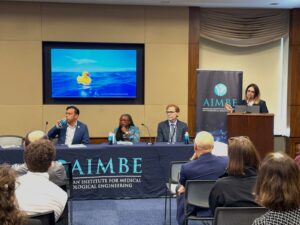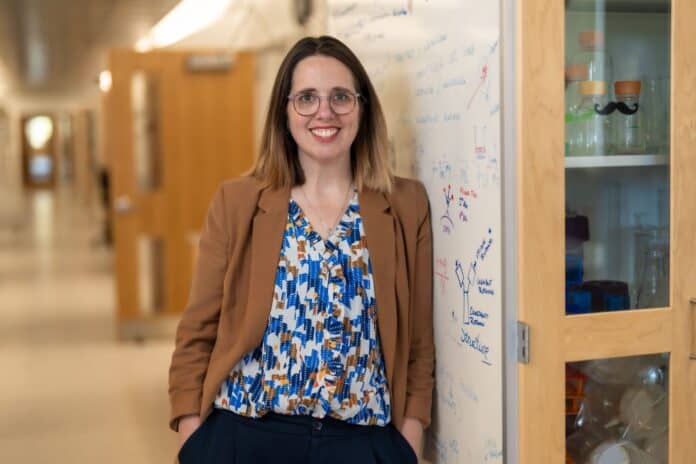Fluid moves unnoticed through the brain at a subtle yet constant pace, clearing away waste and delivering the oxygen and nutrients that keep our minds working. To Virginia Tech biomedical engineer Jennifer Munson, those hidden streams hold powerful clues about how disease takes hold — and how healing might begin.
Her work informs treatment for cancers, brain fog in people undergoing chemotherapy, and even Alzheimer’s disease.
“In tumors, you have high pressure right next to low pressure — like a storm system forming over calm skies,” said Munson, who directs the Fralin Biomedical Research Institute’s Cancer Research Center in Roanoke. “That pressure difference drives fluid flow, and in the brain, that movement of fluid can change everything from how a tumor spreads to how cells in the brain behave.”
Munson will deliver the next Maury Strauss Distinguished Public Lecture on Oct. 30 at the Fralin Biomedical Research Institute at VTC in Roanoke.
Her lab studies interstitial flow — the nearly invisible movement of fluid between cells within tissues. In healthy brains, this slow circulation helps clear waste, deliver nutrients, and maintain balance. When it speeds up, tumors may become more invasive.
“When flow is too fast, as it is in some brain tumors, it can push cancer cells into nearby healthy tissue,” Munson said. “When it’s too slow, as we see in aging or after chemotherapy, that can contribute to cognitive decline. Understanding those extremes gives us clues to possible therapies.”
In her latest findings, published this month in Communications Biology, Munson’s team uncovered a potential link between chemotherapy, fluid drainage, and brain fog — the memory and concentration problems that affect many cancer survivors.
The study found that common chemotherapy drugs can impair the brain’s meningeal lymphatic system, a network of vessels that helps remove waste and regulate immune responses. Using advanced mouse and tissue-engineered models, the researchers showed that reduced lymphatic drainage may underlie the cognitive symptoms many patients experience after treatment.
“What we see is a shrinking of the lymphatic vessels and less branching — signs that the system isn’t regenerating in beneficial ways,” Munson said. “That could potentially account for some of these memory deficits, similar to what we see in Alzheimer’s disease.”
Munson’s research connects microfluidics, tissue engineering, and neuroscience — advancing a field that is drawing increasing national attention from research agencies and policy leaders.

In September, Munson joined Bruce Tromberg, director of the National Institute of Biomedical Imaging and Bioengineering, and Wilbur Lam, physician-scientist at Emory University, to brief congressional leaders on the potential of using engineered tissue and computational approaches to study neurological disease. The briefing was organized by the American Institute for Medical and Biological Engineering, where she is a fellow.
“Innovative approaches involving tissue engineering, computational models, and fluid flow are bridging the gap between medicine and technology,” Munson said.
An elected fellow of the Biomedical Engineering Society, Munson was part of a team that received the National Institutes of Health Complementary Animal Research in Experimentation Challenge Prize, and she received Virginia Tech’s Innovations Launch Start-Up Builder Award for her leadership in translating research into real-world applications. She was also a finalist for the Roanoke-Blacksburg Technology Council’s Entrepreneur of the Year Award.
Munson co-founded Cairina Inc., a biotechnology startup transforming her lab’s discoveries about fluid flow and cancer into new models for planning treatments. The company is one of several Fralin Biomedical Research Institute at VTC spinoffs advancing the institute’s mission to turn scientific discovery into tangible health solutions and successful commercialization enterprises in the Roanoke region.
Her presentation, “How Fluid Flow Shapes the Brain: Cancer and Cognitive Function,” will take place at 5:30 p.m. Thursday, Oct. 30. The event begins with a reception at 5 p.m. at the Fralin Biomedical Research Institute, 2 Riverside Circle, Roanoke. The talk is free and open to the public, with options to attend in person or via live webcast.
The lectures feature prominent national and international scientists. While most are guests from outside the region, Munson represents one of the institute’s hometown researchers blazing new trails.
“Dr. Munson represents the ideal researcher at the Fralin Biomedical Research Institute at VTC,” said Michael Friedlander, the research institute’s executive director and Virginia Tech’s vice president for health sciences and technology. “She brings the rigor of engineering and quantitative fundamental science to solving real world problems that impact health. For example, her recent work on the role of lymphatics in chemotherapy-induced brain fog has provided important new insights into this process that offers a potentially powerful new lens into design of mitigation strategies that could benefit many cancer patients.”
“Having the opportunity to share this science with the community is incredibly meaningful,” said Munson, who is a professor with the research institute and in the Department of Biomedical Engineering and Mechanics in the College of Engineering. “I love when people ask questions. Sometimes, they reveal what’s confusing about the science, and that helps me communicate better. Other times, a question sparks a completely new idea.”
Munson’s upcoming lecture will bring together the threads of her research — from cancer modeling to cognitive function — and invite audiences to consider how the invisible movement of fluid in the brain connects the body’s most complex systems.
The lecture series is named for Maury Strauss, a longtime community benefactor and businessman whose support for biomedical research helped bring leading discussions of science and medicine to the greater Roanoke community.
The event is free and open to the public, with both in-person and livestreamoptions available.
By John Pastor


